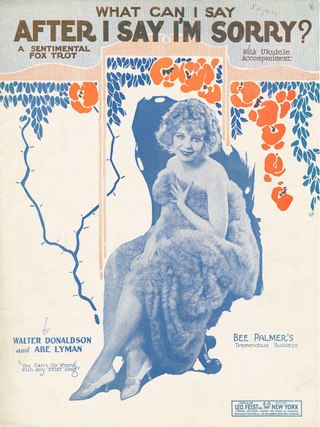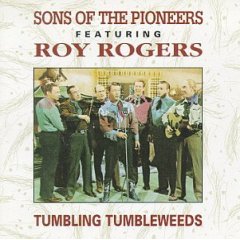"Thinking of You" is a popular song, composed by Harry Ruby with lyrics by Bert Kalmar. It was introduced in the Broadway show, The Five O'Clock Girl (1927) when it was sung by Mary Eaton and Oscar Shaw.
"All I Do Is Dream of You" is a popular song. The music was written by Nacio Herb Brown, the lyrics by Arthur Freed. The song was published in 1934. It was originally written for the Joan Crawford film Sadie McKee (1934) when it was played during the opening credits and later sung by Gene Raymond three times. It was also sung in the film by Earl Oxford in a show. The song is also featured in the films Singin' in the Rain, A Night at the Opera, The Affairs of Dobie Gillis, and Crimes and Misdemeanors.
"A Hundred Years from Today" is a popular song published in 1933 with music by Victor Young and lyrics by Ned Washington and Joe Young. The song was included in the London production of Lew Leslie's Blackbirds of 1934.
"Oh, Lady Be Good!" is a 1924 song by George and Ira Gershwin. It was introduced by Walter Catlett in the Broadway musical Lady, Be Good! written by Guy Bolton, Fred Thompson, and the Gershwin brothers and starring Fred and Adele Astaire. The song was also performed by the chorus in the film Lady Be Good (1941), although the film is unrelated to the musical.
"The One I Love (Belongs to Somebody Else)" is a popular song composed by Isham Jones with lyrics by Gus Kahn. The song was recorded by Isham Jones' Orchestra on December 21, 1923, at Brunswick Studios in New York City, and published on January 7, 1924. On January 17 in Chicago, Jones recorded another version, with Al Jolson on lead vocals. Both versions made the charts that Spring, with Jolson's peaking at number 2, and Jones' at number 5. Sophie Tucker recorded her version February 1924, released on Okeh 40054.
"I'll Get By (As Long as I Have You)" is a popular song with music by Fred E. Ahlert and lyrics by Roy Turk. The song was published in 1928. Versions by Nick Lucas, Aileen Stanley and, most successfully, Ruth Etting, all charted in America in 1929.
"I May Be Wrong " is a popular song. The music was written by Henry Sullivan, the lyrics by Harry Ruskin. The song was published in 1929 and it was included in the musical revue Murray Anderson's Almanac which ran for 69 performances at Erlanger's Theatre on Broadway in 1929. It is said that the song was written on-demand for John Murray Anderson.
"I've Got a Crush on You" is a song composed by George Gershwin, with lyrics by Ira Gershwin. It is unique among Gershwin compositions in that it was used for two different Broadway productions: Treasure Girl (1928), when it was introduced by Clifton Webb and Mary Hay, and Strike Up the Band (1930), when it was sung by Doris Carson and Gordon Smith. It was later included in the tribute musical Nice Work If You Can Get It (2012), in which it was sung by Jennifer Laura Thompson. When covered by Frank Sinatra he was a part of Columbia Records.
"I Was Doing All Right" is a song composed by George Gershwin, with lyrics by Ira Gershwin. It was introduced by Ella Logan in the 1937 film The Goldwyn Follies.
"That Certain Feeling" is a 1925 song composed by George Gershwin, with lyrics by Ira Gershwin.

"Nobody's Sweetheart", also known as "Nobody's Sweetheart Now" and "You're Nobody's Sweetheart Now", is a popular song, written in 1924, with music by Billy Meyers and Elmer Schoebel, and lyrics by Gus Kahn and Ernie Erdman. The song is a jazz and pop standard.

"Everybody Loves My Baby", also known as "Everybody Loves My Baby, but My Baby Don't Love Nobody but Me", is a popular and jazz standard song composed by Spencer Williams in 1924. Lyrics were written by Jack Palmer.
"(You'd Be So) Easy to Love" is a popular song written by Cole Porter for William Gaxton to sing in the 1934 Broadway show Anything Goes. However Gaxton was unhappy about its wide vocal range and it was cut from the musical. Porter re-wrote it for the 1936 film Born to Dance, where it was introduced by Eleanor Powell, James Stewart, and Frances Langford under its alternate title, "Easy to Love". The song was later added to the 1987 and 2011 revivals of Anything Goes under the complete title "You’d Be So Easy to Love".
"Memories" is a popular song with music by Egbert Van Alstyne and lyrics by Gus Kahn, published in 1915.

"What Can I Say After I Say I'm Sorry?" is a popular song by Walter Donaldson and Abe Lyman, published in 1926.

"Out of Nowhere" is a popular song composed by Johnny Green with lyrics by Edward Heyman and published by Famous Music. It was popularized by Bing Crosby, and was the first recording under his Brunswick Records contract. He recorded it on March 30, 1931 and it became his first number one hit as a solo artist. Crosby also sang it in the film Confessions of a Co-Ed (1931) and in his short film I Surrender Dear (1931). He recorded it again in 1954 for his album Bing: A Musical Autobiography.

"Tumbling Tumbleweeds" is a Western music song composed by Bob Nolan, a founding member of the Sons of the Pioneers. Nolan wrote the song in the early 1930s while he was working as a caddy and living in Los Angeles. It was first recorded by the Sons of the Pioneers in 1934, and it became one of the most famous songs associated with the group. Originally titled "Tumbling Leaves", the song was reworked into the title "Tumbling Tumbleweeds" and into more widespread fame with the 1935 film of the same name starring Gene Autry. Members of the Western Writers of America chose it as one of the Top 100 Western songs of all time.
Liza (All the Clouds'll Roll Away)" is a song composed by George Gershwin with lyrics by Ira Gershwin and Gus Kahn. It was introduced in 1929 by Ruby Keeler (as Dixie Dugan) in Florenz Ziegfeld's musical Show Girl. The stage performances were accompanied by the Duke Ellington Orchestra. On the show's opening night in Boston on June 25, 1929, Keeler's husband and popular singer Al Jolson suddenly stood up from his seat in the third row and sang a chorus of the song, much to the surprise of the audience and Gershwin himself. Jolson recorded the song a few days later on July 6, 1929, and his rendition rose to number nine on the charts of the day.
Moanin' Low is a popular torch song. The music was written by Ralph Rainger; the lyrics by Howard Dietz. The song was published in 1929 and was introduced that same year in the musical revue The Little Show by Libby Holman becoming a hit and Holman's signature song. A recording by The Charleston Chasers was also popular in 1929.
"Coquette" is a 1928 fox trot jazz standard. It was composed by Johnny Green and Carmen Lombardo, with lyrics by Gus Kahn. Guy Lombardo had great success with the song in 1928.





